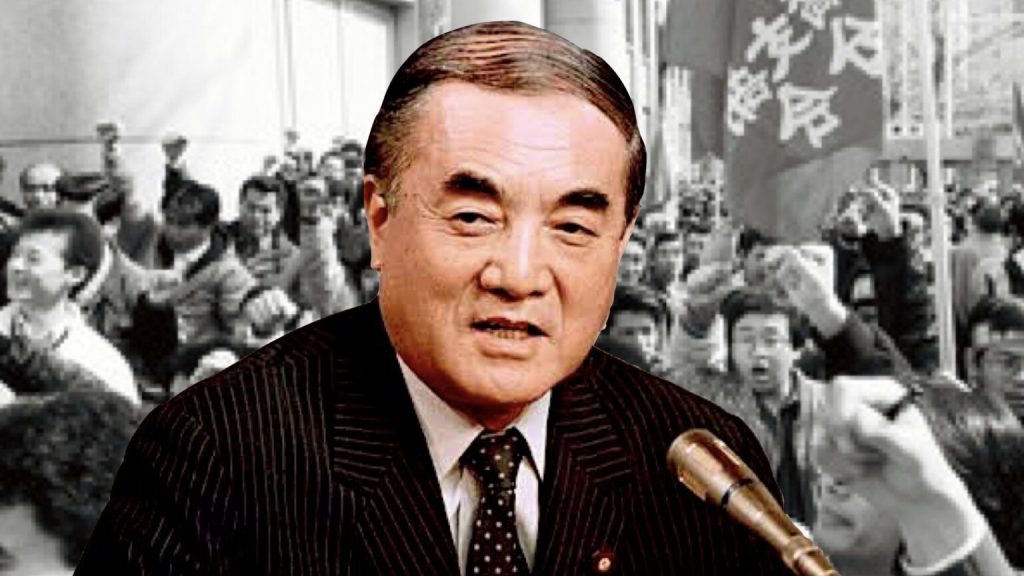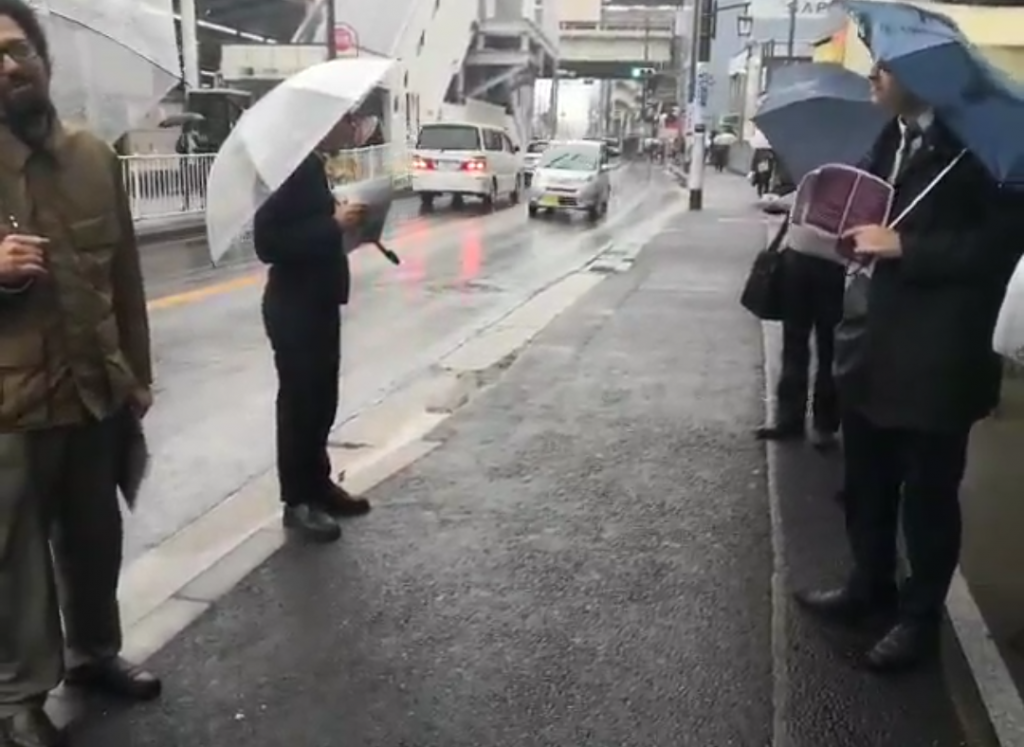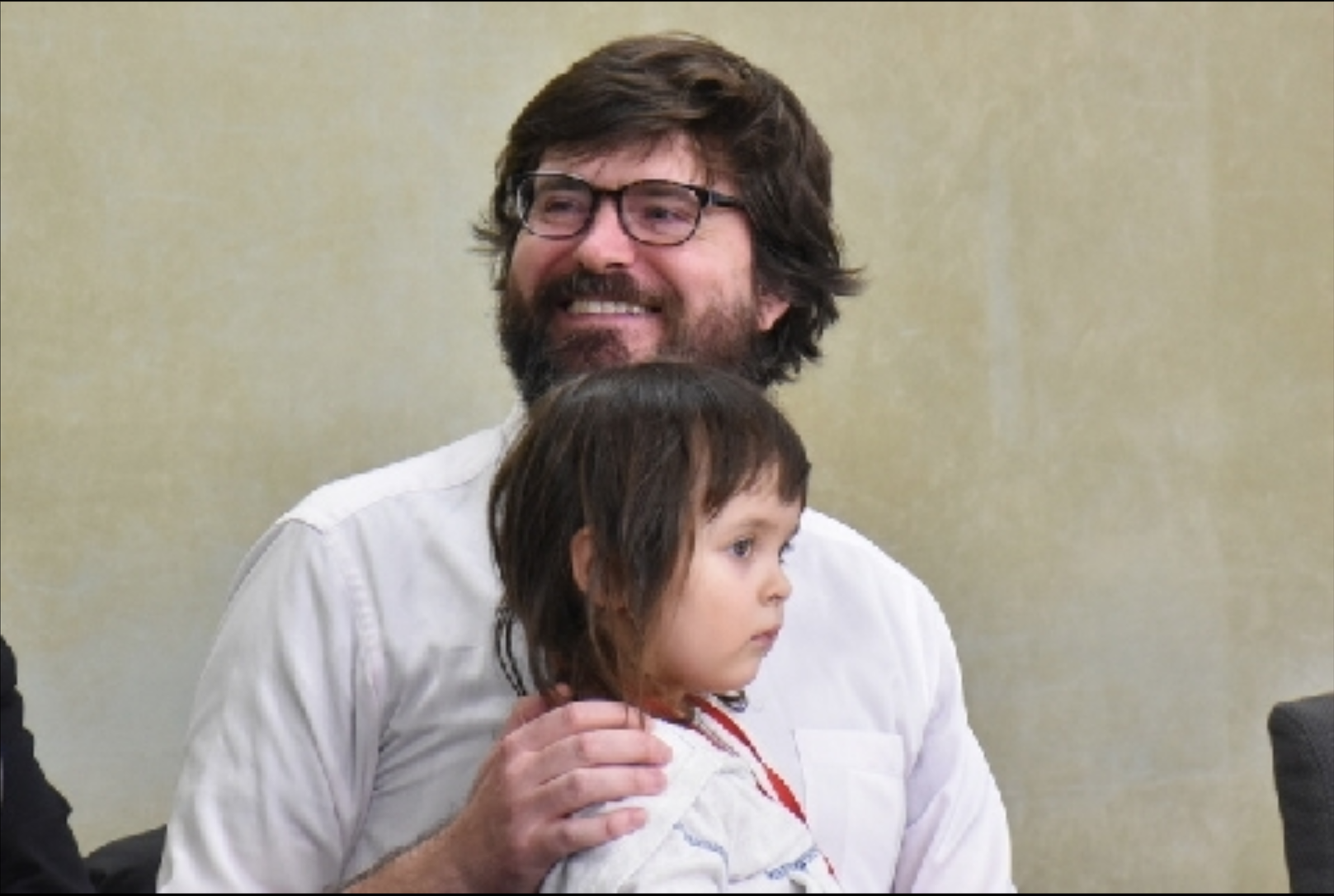中曽根康弘元首相が2019年11月29日、101歳で亡くなった。1971年生まれの筆者にとって、中曽根氏は良くも悪くも鮮明に記憶に残る総理大臣の一人である。日本の戦後の総理大臣は概して「調整役」的存在に徹し、カリスマ性が求められてこなかったなか、中曽根氏はもしかしたら、初めてカリスマを志向した総理大臣だったかもしれない。“ロン・ヤス関係”と呼ばれた、アメリカのレーガン元大統領との“日米蜜月関係”の構築は、日本の「対米従属化」をいっそう加速させたといえるかもしれない。だが、当時中学生~高校生の子どもだった筆者の目には、初めて日本の首相が、アメリカと“対等に”そして“フレンドリーに”交渉する姿を見た気がした。それは単純に、彼の身長が178センチとこれまでの総理大臣の中では群を抜いて高く、アメリカ大統領と並んだときに引けをとらなかったという視覚的な印象もあるだろう。
Bread and Roses: How Nakasone Crushed Japan’s Labor Movement

SNA (Tokyo) — Prime Minister Yasuhiro Nakasone died this past November 29. During his tenure as prime minister from 1982 to 1987, he had deepened Japan’s subordination to the US hegemon through his Ron-Yasu Bromance with President Ronald Reagan. But to one middle and high schooler in the 1980s, he seemed to be the first prime minister to hold his own in friendly talks with the United States, almost as an equal.
シェーン英会話講師、スト権行使拡大
2019年12月21日、シェーン英会話スクールの今年最後のレッスン日、東ゼン労組シェーン労働組合の組合員たちは、雇用の安定、社会保険への加入、全従業員の賃金3%引き上げ等の要求実現に向け、ストライキを起こした。このストライキは、5年間の労働紛争の歴史の中でも最も大きなストライキとなった。
シェーン英会話スクールにとって土曜日というのは一番忙しい曜日であり、講師の出勤人数も週の中では最大であるため、代わりの講師を手配するのが難しい曜日でもある。
カバー講師も含め計13人もの組合員がスト権を行使した。同ストライキにより、数々のスクールでスケジュールの混乱や授業の休講が発生した。
同組合および支部は、これまでシェーン英会話スクールと数多くの団体交渉や事務折衝を行ってきたが、要求実現に対する進歩は見られないままであったため今回のストライキを決行した。今回のストライキで新たな組合員も一人加わった。
Shane Teachers Expand Strike
The last day before Winter Solstice (Dec. 21), Shane teachers upped the ante in their fight for job security, pension and health insurance, and a 3% pay hike.
In the wake of membership, growth, teachers at a dozen different schools lay down their chalk Saturday. Reports indicate schedule disruptions and cancelled classes.
Tozen Union and its chapter Shane Workers Union negotiated both on and off the record with the English language school but failed to make progress on demands, which included a union page in the Shane teachers bimonthly newsletter.
Management maintained its hard-line, making nothing more than symbolic gestures at concession.
Union teachers determined they had no choice but to muster their courage and strike both on Dec. 18 and then Dec. 21. The latter marked their largest strike in over five years of dispute.
At least one non-member joined the union just to participate in the strike.
シェーン語学学校との労働紛争が6年目を迎え、講師は組織化とストへ

Locations : Kichinoji(吉祥寺)、Nishi-funabashi(西船橋)、Kita-urawa(北浦和)
leafleting for recruitment: Kichinoji(吉祥寺)、Nishi-funabashi(西船橋)、Kita-urawa(北浦和)
Shane Workers’ Union members leafleting to recruit new members
11月下旬金曜、初冬の寒さが混じり込む雨降りの朝、シェーン労働組合(SWU)の組合員らは傘をさし、吉祥寺校、西船橋校、北浦和校のそれぞれの研修を受けに来た同僚たちに挨拶を交わす。
5年前の同組合シェーンコーポレーションにおける、初めてのストライキを行った信念強い組合員であるエズラ・ウルノー執行委員は、悪天候の中、リチカ・シン書記長と共に吉祥寺校でのビラ配りを奮起し行った。
北浦和校では、スタイリッシュなニット帽からはみ出る長髪天パが特徴のオレン・フランクハム組合員が、埼玉地区で初の、また彼自身としても初の組織化活動を行った。
東ゼン労組ベグント支部の組合員の団結なく、オレン組合員一人だけでの決行は、実現できなかった。ベグント支部には恩義を感じる。
一方、千葉地区では、組合活動に著しい盛り上がりが見られる。マーチン・ワイト組合員は、
シェーン稲毛校における従業員代表選挙に正当に当選した彼のポジションを奪おうとした経営側の非民主主義的な行動に負けず、職場における民主主義の模範を示してくれた。同組合員が初めてスト権を行使し、2名の同僚を感化させ、公正な労働条件のために共に闘う新たな仲間を組織化した。
東ゼン労組不屈の専従オルグ、ジェローム・ロスマンとその他支援者たち、そして多数の参加者によって、組合の粘り強さと団結が示された。私たちはこれを真剣に活動をしている。
シェーン労働組合の組合員らは、全体的に評価され、組合加盟への関心が多く見て取れた。加盟手続きキットは何人かの手に渡ったため、新たに申込書が本部に届くことに楽しみにしている。
先月、解雇撤回を命令した東京高裁で勝訴を収めた、東ゼン労組シェーン労組執行委員長であるアダム・クリーブ氏は、「今日私たち組合員が成し遂げたことを大変誇りに思っています。私たちには勢いがあり、更に成長しています」と述べた。
11月23日(土)は、勤労感謝の日である。この日は、人々が互いの勤労を感謝し合うための日本国民の休日とされている。しかし、シェーンコーポレーションは、従業員のために行われる通年行事を中止した。例年は、勤労感謝の日の前日、無料ドリンクと催し物があったにもかかわらず、今年用意されていたのは、終日研修とドーナツ一箱のみであった。土曜日もまた、休日の予定であったにもかかわらず、台風ハギビスを理由に休講した一日分のレッスンを補講するために、働かなければならなかった。
これが勤労感謝の日に行われた、シェーンコーポレーションによる労働者への感謝のあらわし方である。
土曜日も、ストを打ち、新たに3名の講師がスト権を行使することをきっかけに組合に加盟した。スト参加者の勇敢さは尊敬に値する。既存の組合員が団結をし、共にストに参加した。
講師に対する昇給は、少なくとも7年間なく、シェーン労組は従業員全員の賃金を一律3%引き上げるためのストライキを行っている。また、ストライキの要求事項の一つに、社会保険加入と、雇用安定を図るための無期雇用もある。
シェーンコーポレーションはこのストライキ紛争の終結のために5年間交渉を続けてきたが、それは底知れず失敗を繰り返してきた。当組合の要求は理にかなったものである。今こそ、経営側は何かしらの協議をする時であるが、組合が大きくなり続けるのと同時に、彼らは遅れをとるであろう。
シェーン労組はこれから先もずっと、ここに居座り続ける。シェーンで働く全従業員のより良い労働条件の為に闘うことを諦めない。
2019年11月23日
シェーン労組 執行委員長
アダム・クリーブ
Translation by Mizuho Matsumoto
Unionized teachers recruit and strike as dispute with Shane language school enters sixth year
As the first winter chill creeps into the Tokyo air on a rainy Friday morning in late November, members of the Shane Workers Union (SWU), sheltering under their umbrellas, greet their co-workers arriving for training in Kichijoji, Nishi Funabashi and Kita Urawa.
SWU stalwart Ezra Woolnough, veteran of the first strike at Shane Corp five years ago braced the poor weather to distribute leaflets at Kichijoji school with General Secretary Ritika Singh, the core of SWU’s new dynamic cohort.
In Kita Urawa,Orren Frankham, his flowing locks peeking out from beneath a stylish beanie, performed the first ever recruitment action in Saitama district and indeed his first. Without the solidarity of a Tozen Begunto member we would not have sent Orren out on his own.
Begunto, we owe you one.
Over in Chiba we’ve seen a surge in union activity. Showing us how democracy in the workplace should be done, Martin White repelled management’s undemocratic attempts to usurp his position as duly elected workplace representative at Inage school. He breaks his strike duck bringing two new entrants into the struggle for fair working conditions.
Joined by Tozen organiser, the indomitable Gerome Rothman and guests, an impressive turnout demonstrates the commitment and solidarity of the union. We take this seriously.
The members of SWU were well received overall and a lot of interest shown in joining the union. Several membership kits were handed out and we look forward to receiving those applications very soon.
Recently reinstated at Shane after a High Court victory last month, Branch President Adam Cleeve said “I’m incredibly proud of the members for what they’ve achieved today. The momentum is with us and we are growing.”
Saturday 23rd November is Labour Thanksgiving Day, Kinrō Kansha no Hi. A day marked as a national holiday in Japan to give one another thanks for their hard work. Shane Corp have abandoned the traditional annual party for staff. Instead of free drinks and entertainment a full day of training and a box of doughnuts was on offer Friday. Saturday was also a day staff expected to have off but instead are having to work to make up a day lost to Typhoon Hagibis. This is how Shane Corp gives thanks to their workforce on Labour Thanksgiving.
Strike action also took place on Saturday with a further three teachers joining SWU by withdrawing their labour. I respect their bravery. We won’t let them strike alone and were joined by established members of SWU.
There have been no pay rises for teachers at Shane for at least 7 years and SWU are striking for an across the board rise of 3%. Also in the strike demands are Shakai Hoken (employer contributory health and pension) and job security through permanent contracts.
SWU is here for good, we’re a part of the furniture and we’re not giving up the fight for better working conditions for all the workers at Shane. Shane Corp have had five years to negotiate an end to the strikes but have unfathomably failed to do so. Our demands are perfectly reasonable. Now is the time for management to put something on the table but I expect they will continue to delay as SWU continues to grow in strength and numbers.
Adam Cleeve
SWU Branch President
November 23rd 2019
Bread and Roses: Tokyo Tribunal Turns Tables on Shane Language School
Full disclosure: I am the executive president of Tokyo General Union (Tozen), and the plaintiff in this court case is a member of my union. I have a clear conflict of interest here since, although Tozen is not a direct party to the litigation, the union’s fight is key background.
So, dear reader, please read this month’s installment while keeping in mind my inevitable subjectivity on the matter.
Just last month—on October 9, 2019—the Tokyo High Court threw out a lower court ruling and voided a 2017 firing from language school Shane Corporation. The appellant, Adam Cleeve, serves as executive president of Shane Workers Union (SWU), a local chapter of Tozen. He taught English at Shane English School until the employer fired him in February 2017.
Cleeve tried to take paid leave to be with his wife during childbirth and help her care for the new baby. But Shane and Cleeve’s understandings are cleaved into two mutually exclusive understandings of how paid leave works in Japan. Shane management counted his days off as absent without leave, then refused to renew his revolving one-year contract.
He couldn’t bear the utter unjust nature of the firing (my emotion getting in the way now) and sued to overturn the dismissal in the Tokyo District Court. The lower court upheld the dismissal, however, and rejected Cleeve’s claims in a verdict that accepts the defendant’s claims, misreads the law on paid leave, ignores the plaintiff’s assertions, and errs on several facts.
Shane claimed that Cleeve had neglected a child in his class who had fallen and split her lip. He testified in detail the measures he took to care for her and inform her father. Cleeve and the union were knocked off their feet by the first ruling’s ignorance and injustice.
At this point, after two years, I would have forgiven him for giving up the fight and saying screw you to the school, the court, and the whole cruel world. But Cleeve kept the towel in his corner, stood back up, wiped off the sweat, stomped back into the ring, and dragged the case over to the appellate court. He stayed fighting because he could not accept the fact that Shane had, with impunity, violated his right to paid holiday.
He took a large corporation to court with no way to know the time or nature of the outcome, just after getting sacked, after his baby girl was born, after his wife had just given birth to that baby girl. All this required courage, determination, and tenacity, not to mention time and money.
Cleeve saw the fight as not his own but rather a fight for all his workplace comrades. He dared not let up the union’s fight to protect all workers’ right to annual paid leave. His wife and daughter were there for him, as were his union comrades who have fought alongside him for so long. Indeed, even Cleeve would have found it difficult or impossible to fight till the bitter (or sweet) end had he not had a labor union in his corner.
“This is just one small drop in the struggle for workers’ rights,” Cleeve commented on the ruling. “We owe it to each other to hold companies to account and to show solidarity with one another other.” Asked about his current situation, he said, “Now that I’m back at work, my vow is to build a union at Shane that equalizes the power between worker and employer.”
Ok, sip your morning coffee, and let’s take a look at the legal nitty gritty of this case.
Shane hires Cleeve in March 2015 on a one-year contract, which gets renewed the following March. He applies to take paid holidays for the birth of his first child due in November 2016. The company turns him down. Shane grants twenty paid holidays a year but says only five can be taken at the teacher’s discretion. The company designates the other fifteen. Cleeve takes the days anyway, and management counts him as absent without leave. Shane refuses to continue his employment after February 28, 2017.
Paid leave—called nenji yukyu kyuka, nenkyu, or yukyu—is a right guaranteed under Article 39 of the Labor Standards Act (Rokiho). This 1947 law affords you ten days after six months of employment (assuming you work five days a week), Twelve more months gives you eleven days, then the next year twelve, and so on. Each year you get a bigger tranche of yukyu till you top out at twenty days a year. You can carry each tranche over to the following year, but it’s use-them-or-lose-them after that.
One point of contention in the Shane case was over the system that designates all but five of the twenty paid holidays the school offers even in the first year. This system (called nenji yukyu kyuka keikakuteki fuyo) was legislated in 1987, ostensibly to ensure workers took paid holidays and that employers could better manage paid holidays. But use of the system requires a roshi kyotei agreement concluded between the employer and a majority employee representative.
Shane had not signed such a contract at the time of these events. The lower court evaded this issue and ruled that Cleeve’s alleged poor professionalism and multiple absences sufficed for dismissal. The High Court, however, said Shane cannot designate the legally mandated paid holidays without the roshi kyotei.
The Tokyo High Court added that Cleeve should be able to take all twenty days freely, meaning the “designated” days off were invalid. The days Cleeve did not show up for work were either legitimate paid holidays, as per the law, or days that the union struck—a right guaranteed by the Constitution of Japan. In turn, that means the non-renewal “lacked objective, rational grounds according to social norms.” That phrase represents the litigant sweet spot if you want to prove a firing needs overturning.
Among all the points addressed by the court, I was particularly impressed by its recognition of the importance of the legal principle called “procedural justice.”
The system of designating government-guaranteed paid leave days recognizes the employer’s involvement in what is supposed to be a free decision by workers. All the more reason the system must be run properly to avoid it becoming yet another tool helping management keep workers in line. A pact between management and a duly elected representative is required to designate paid holidays. Another such an agreement (called an Article 36 Agreement, saburoku kyotei, since it is stipulated there in the Labor Standards Act) is also required before workers can be asked to work more than eight hours a day. (Incidentally, workers in Japan take 51.1% of their allotted leave, according to a Ministry of Labor, Health and Welfare study. Workers are flushing half their paid leave down the drain. One of Prime Minister Shinzo Abe’s workplace reforms that kicked in this April is a new rule that forces employers to require their employees to take at least five days if they don’t take any on their own.)
This Article 36 Agreement document is crucial since it reflects the will of workers. Yet many workplace representatives are appointed by management rather than elected by employees. The representative then signs it without properly reading what she is signing. This happens at Shane as well, and our union is currently disputing just this issue in negotiations.
“Shane will do whatever they can to prevent their teachers and staff from exercising their rights under labor law—in this case, the right to take paid holidays freely,” said Tozen Senior Organizer Louis Carlet. “They make their own rules and apparently believe their rules take precedence over the law.”
Cleeve and the Shane Workers Union have drawn attention to the problem of employers ignoring workers’ voices during these processes. Although the lower court ignored this problem, the Tokyo High Court recognized that an employer cannot simply decide paid holidays unilaterally without input from the workers themselves. This verdict defends something well worth defending.
This article was written by Hifumi Okunuki, and originally published by the Shingetsu News Agency (SNA).
GABA講師のストライキ権獲得 労働委員会
2019年10月23日
東京都労働委員会は今日、英会話スクールのGABAに対し、講師達のストライキ権を認めなければならないと命令を下した。
2016年に、東ゼン労組と同組合の支部であるGABA労働組合は、ストライキを打った講師陣に対し発行された警告書を撤回するよう、救済を申し立てた。
GABAは、1000人以上の講師と業務委託契約を結んでいるが、講師たちは単なるサービス提供者だとし、労働組合法に定められている労働者の権利はないと、主張した
委員会は、講師たちは労働組合法が適用される条件を満たしているとし、ストライキの妨害行為に対し謝罪するよう、会社側に指示した。
大阪府労働委員会は、以前、組合(大阪にあるゼネラルユニオン、委員長は、デニス・テゾラット)を組織しているGABAの講師たちの団体交渉権を認めている。
これは非組合員も含む、全てのGABA講師たちの勝利です。」GABA労働組合の執行委員長タイラー・クリステンセンはこう述べる。
「私達がずっと言ってきたように、GABAの講師たちは通常の従業員たちと同等の権利を持っている。ということを確かにしました。今ここにて、私たちのストライキの権利は護られました。再び交渉の場に立ち、またこれからもGABAの講師たちのために、労働条件を改善し続けていくことを私たちは前向きに考えています。」
経営側は、もし仮に講師たちに団体交渉権があったとしても、ストライキ権も同時に持つべきではないと主張をした。
団結権、団体交渉権、団体行動権(ストライキを含む)は、労働三権として日本国憲法第28条にその規定が設けられている。
委員会は、労働三権を分割して適用できるという、GABAが ”作り上げた”主張を却下した。
GABA講師のスト権認定 – 都労委 毎日新聞に掲載
都労委が2019年10月23日、英会話学校であるGABAに対し、業務委託契約を結ぶ5人の講師に対し労働組合法が定める労働者と認定し、ストライキを理由とした警告を発行しないよう会社側に命じた件に関する記事が、毎日新聞に掲載されました。
Interac Teachers In Kanto Enter Second Round of Collective Bargaining
Interac teachers in Kanto enter second round of collective bargaining. They’re demanding full-time permanent employment, shakai hoken, a 20% pay raise, a ¥600,000 yearly bonus, a time card, a prior consultation agreement, and a union page on the Interac employee website.

